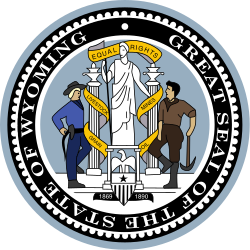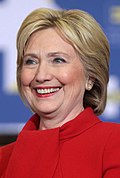State convention pledging national delegates
The first-tier county caucuses elected 280 state delegates to the Wyoming Democratic Party's state convention, took place on May 28. There, all present state delegates nominated the national delegates to the 2016 Democratic National Convention.
While Wyoming's Democrats sent 18 delegates to the 2016 Democratic National Convention, only 14 out of these will be pledged to the candidates in proportion to the electorate's preferences. The remaining four Wyoming delegates are unpledged "Party Leaders and Elected Officials" (PLEOs), or "Superdelegates", who may vote for whomever they wish at the party's upcoming National Convention. [3]
Out of the 14 pledged delegates, eight district-level delegates pledged to one of the candidates in proportion to the support received at all 23 caucuses of Wyoming's single congressional district. Another six delegates are pledged at the 28 May State Convention, in proportion to the support each candidate receives there. Candidates with less than 15% support were discarded for being "not viable". [6]



